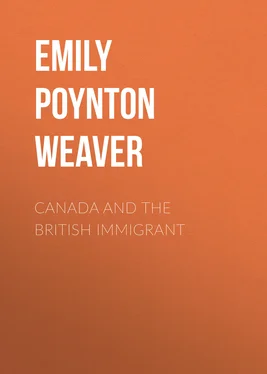Emily Poynton Weaver - Canada and the British immigrant
Здесь есть возможность читать онлайн «Emily Poynton Weaver - Canada and the British immigrant» — ознакомительный отрывок электронной книги совершенно бесплатно, а после прочтения отрывка купить полную версию. В некоторых случаях можно слушать аудио, скачать через торрент в формате fb2 и присутствует краткое содержание. Жанр: Путешествия и география, История, foreign_edu, foreign_antique, foreign_prose, на английском языке. Описание произведения, (предисловие) а так же отзывы посетителей доступны на портале библиотеки ЛибКат.
- Название:Canada and the British immigrant
- Автор:
- Жанр:
- Год:неизвестен
- ISBN:нет данных
- Рейтинг книги:3 / 5. Голосов: 1
-
Избранное:Добавить в избранное
- Отзывы:
-
Ваша оценка:
- 60
- 1
- 2
- 3
- 4
- 5
Canada and the British immigrant: краткое содержание, описание и аннотация
Предлагаем к чтению аннотацию, описание, краткое содержание или предисловие (зависит от того, что написал сам автор книги «Canada and the British immigrant»). Если вы не нашли необходимую информацию о книге — напишите в комментариях, мы постараемся отыскать её.
Canada and the British immigrant — читать онлайн ознакомительный отрывок
Ниже представлен текст книги, разбитый по страницам. Система сохранения места последней прочитанной страницы, позволяет с удобством читать онлайн бесплатно книгу «Canada and the British immigrant», без необходимости каждый раз заново искать на чём Вы остановились. Поставьте закладку, и сможете в любой момент перейти на страницу, на которой закончили чтение.
Интервал:
Закладка:
In different parts of British North America the plan of a Confederation of the Provinces, with one central government to control matters common to all, and provincial legislatures to manage local affairs, was advocated from time to time. The Maritime Provinces of Nova Scotia, New Brunswick, and Prince Edward Island had their own problems and difficulties, and in 1864 their statesmen agreed to meet at Charlottetown, in Prince Edward Island, to discuss the question of a union amongst themselves.
By that time affairs in United Canada (was there ever a greater misnomer?) had reached a positive deadlock. At the beginning of the year, in succession to a reform ministry, which had only weathered the political tempests for a few months, Sir Etienne Taché and Mr. (afterwards Sir) John A. Macdonald had formed a Conservative government. Even at first they had a bare majority and presently they were outvoted by a majority so narrow that there was not any reasonable ground for hope that if they resigned, their opponents would be less helpless, or that if parliament were dissolved parties would be less evenly balanced. A dissolution seemed inevitable, however, when there arose a sudden light in the darkness.
George Brown, the leader of the English-speaking reformers, came to the rescue and promised the support of himself and his party to the ministers, if they would seriously set themselves to find a way out of the difficulty. Macdonald and his coadjutors met their old opponents half way. A coalition government was formed, and it was decided to try to form a federal, in place of a legislative, union, including all the provinces or the two Canadas alone. It is needless here to dwell on the delays and difficulties with which the project was beset. In October, 1864, representatives of Upper and Lower Canada, and of the Maritime Provinces, including Newfoundland, met at Quebec to formulate a scheme of confederation; but neither of the two island provinces made part of the Dominion of Canada, as it commenced its existence on July 1, 1867. Prince Edward Island came into the union six years later; but Newfoundland stands aloof to this day.
The British North America Act of the Imperial parliament, which finally gave effect to the desire of the provinces for union, embodied, with little alteration, the scheme agreed upon at Quebec in 1864. The act provided for the admission into confederation of other provinces besides the original four, and, as has already been mentioned, the Dominion of Canada now consists of nine provinces besides some large tracts of unorganized and sparsely populated territory in the north.
The Dominion parliament has power to make laws for “the peace, order and good government of Canada,” except with regard to certain matters put under the jurisdiction of the provincial legislatures. The parliament consists of the King (represented by the Governor-General), an Upper House, or Senate, and a Lower House, or House of Commons.
The Senate consists of eighty-three members, who are appointed for life by the Governor-in-Council, but no man who is under thirty years of age, or not by birth or naturalization a British subject, is eligible for appointment. He must also be possessed of real or personal property worth $4,000 (£800), and must be, and continue to be, a resident of the province for which he is appointed.
The House of Commons consists (at present) of two hundred and fourteen members, elected with regard to a fair representation of the relative population of the different sections of the country by the following plan:—The province of Quebec has always sixty-five members, and the other provinces have a number of members bearing the same proportion to their populations as sixty-five bears to the population of Quebec. The representation is adjusted after every decennial census—the last census being taken in 1911. The population of the West naturally increases much faster than that of the older provinces, and consequently every census requires a readjustment in favour of the West. For instance, during the decade following the census of 1891, Ontario had ninety-two members and Manitoba had only seven, but since 1901 the number of Ontario’s members has dropped to eighty-six, while that of Manitoba has risen to ten, and the next readjustment, which is already overdue, will show an even greater change in the balance of population.
In the Dominion, as in the provincial parliaments, the principle followed is that of responsible cabinet government; and in this important respect it resembles the British system, and differs from the government of the United States. In the latter country, the appointment of all the chief executive officers rests with the President, subject to the consent of the Senate. Thus, as Professor Goldwin Smith puts it, “instead of a ministry responsible to the legislature and dependent for existence on its vote, America has a ministry independent of the legislature and irremovable during its term of four years.” But, in Canada, when a man takes office in the ministry he must go back to his constituents for re-election; and though the normal life of the House of Commons is five years, it may be dissolved at any time by the Governor-General on the advice of his ministers. Of course, if a cabinet is defeated it must resign and give place to one which has the confidence of the House. In this way, the will of the people (or it would be more correct to say of the men, for women have as yet no voice in the election of members to parliament) is supreme in Canada; and they must, in the last resort, hold themselves responsible for the doings of the men whom they put or retain in office.
The qualifications entitling persons to vote are the same with regard to the Dominion House of Commons and the provincial legislatures. Women are excluded from voting on any but municipal elections, and males must be of the age of twenty-one years and be British citizens by birth or naturalization. In Ontario, Manitoba, Saskatchewan, Alberta and British Columbia the vote is given after a term of residence varying from six to twelve months (practically to every adult male citizen, though he may be utterly illiterate and ignorant of either the English or French tongues). In the Maritime Provinces even an adult male citizen cannot vote, unless he has been resident for twelve months in the province, and has qualifications “based” on ownership of real property, position as teacher or clergyman, personal property or income. The same applies to Quebec, except that in that province the would-be voter may qualify in one month’s residence.
By the British North America Act, the Dominion parliament has control of all matters not specially assigned to the provincial legislatures. This is another respect in which the Canadian constitution differs from that of the United States, where “the residuum of power” was retained by the States which entered into the Federal Union. In other words, in the United States all matters not specially put under the jurisdiction of the central authority remain to be dealt with by the individual states; while in Canada the authority of the Dominion parliament extends to all affairs not specially reserved to the jurisdiction of the provinces.
In general terms, the Dominion parliament has power to make laws regarding affairs that concern all the provinces, but a number of matters are specially enumerated as being within the jurisdiction of the central government. These are as follows:—Public debt and property; trade and commerce; taxation (any system) and the borrowing of money on the public credit; the postal service; the census and statistics; militia, military and naval service and defence; the fixing of salaries for government officers; lighthouses and coast service; navigation and shipping; fisheries; quarantine; currency and banking; weights and measures; interest; legal tender; bankruptcy, and the general financial and commercial system; patents and copyrights; Indians and reserves for Indians; naturalization; marriage and divorce; the criminal law and penitentiaries; the territories not within the boundaries of any province and the establishment of new provinces.
Читать дальшеИнтервал:
Закладка:
Похожие книги на «Canada and the British immigrant»
Представляем Вашему вниманию похожие книги на «Canada and the British immigrant» списком для выбора. Мы отобрали схожую по названию и смыслу литературу в надежде предоставить читателям больше вариантов отыскать новые, интересные, ещё непрочитанные произведения.
Обсуждение, отзывы о книге «Canada and the British immigrant» и просто собственные мнения читателей. Оставьте ваши комментарии, напишите, что Вы думаете о произведении, его смысле или главных героях. Укажите что конкретно понравилось, а что нет, и почему Вы так считаете.


![О Генри - Граф и свадебный гость [Черное платье] [The Count and the Wedding Guest]](/books/405331/o-genri-graf-i-svadebnyj-gost-chernoe-plate-th-thumb.webp)









